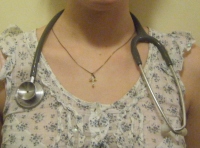Catholic Medical Quarterly Volume 65(1) February 2015
CMA SEEKS TO PROTECT DOCTORS IN TRAINING IN REPRODUCTIVE HEALTH
 In
2014 the Royal College of Obstetriciasns and Gynaecologists issued new
guidelines from the Faculty of Sexual and Reproductive Health on “The
Faculty of Sexual and Reproductive Healthcare Diploma trainees (DFSRH /
NDFSRH) who express Conscientious Objections”.
In
2014 the Royal College of Obstetriciasns and Gynaecologists issued new
guidelines from the Faculty of Sexual and Reproductive Health on “The
Faculty of Sexual and Reproductive Healthcare Diploma trainees (DFSRH /
NDFSRH) who express Conscientious Objections”.
We wrote and asked:
- Will doctors and nurses who do not hold the FSRH Diploma still be allowed to participate in areas of sexual and reproductive healthcare to which they have no moral objections? These areas may include psychosexual counselling, management of STIs, fertility management, natural family planning etc.
- Will doctors and nurses who do not hold the FSRH Diploma still be allowed to train and successfully complete training in Obstetrics and Gynaecology, allowing them to compete for and obtain professional positions in these areas of medicine and nursing?
These questions were asked in concern for Catholic and other healthcare workers who may have moral reservations about participation in certain practices considered legitimate by others and also for prospective patients, especially women, who may wish to receive healthcare from doctors and nurses who share their own religious and moral convictions.
In reply the FSRH stated that
- “The Faculty considers the FSRH Diploma to be the ‘gold standard’ in supporting doctors and nurses in delivering community consultations in sexual and reproductive healthcare. However the Faculty would not seek to prevent any doctor or nurse who does not hold the FSRH Diploma from working in any area of sexual and reproductive healthcare. We would expect any doctor or nurse to follow the relevant guidelines from the GMC/NMC when they are thinking through how they would manage this situation. Ultimately it is a decision for the employer in a service (and their commissioners) to be satisfied that the staff employed are competent to carry out the work for which they are employed.
- The FSRH Diploma is not a requirement for doctors wishing to specialise in Obstetrics and Gynaecology. Trainees in O&G can still complete their training without this provided they fulfil the knowledge criteria. Those with a religious or moral objection to being involved in contraception care can opt out of doing the practical elements of the RCOG’s Sexual and Reproductive Health Module.“
The reader will perhaps feel that doctors are a little in Limbo. While the CMA has done a lot to protect the rightful use of conscience, it is far from easy for those whose conscience tells them that they should (as Pope Francis urges us on page 7) not fit abortifacient IUCDs or cooperate in other forms of artificial contraception.
Copies of the full correspondence between CMA and the FSRH can be viewed by clicking here.
